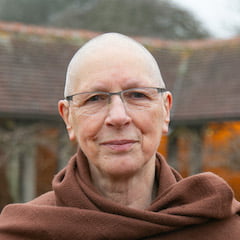
3 фильтры
Очистить

Ajahn Sundara is French and was born in a liberal non-religious family. After studying dance, she worked and taught for a few years in that field. In her early thirties she encountered...
Читать далее

Awareness has a mirror-like quality. We can tap into it right now, become aware of the mind and body as they are in this moment. Perhaps awareness is reflecting the feeling of sleepiness or of not knowing, the feeling of cold or heat, heaviness or lightness. Reflective consciousness can see things, even the things that are closest to us. It reflects feelings of aversion, anger,...
Читать далее
Конец результатов
